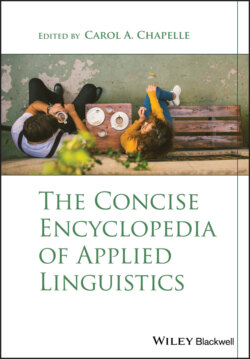Читать книгу The Concise Encyclopedia of Applied Linguistics - Carol A. Chapelle - Страница 33
The African Union and Attitudes Toward African Languages
ОглавлениеGenerally, the attitude of the member states of the AU and the African masses toward the use of the indigenous languages in higher domains such as education and the government and administration is negative. This stems from not only the members' deep‐seated perceptions about the status of the indigenous languages vis‐à‐vis excolonial languages in society, but also the policies that govern language use in the higher domains, for they favor excolonial languages over the indigenous languages (Mfum‐Mensah, 2005). To ensure that the indigenous languages do not compete with excolonial languages, policy makers formulate language policies that are either ambiguous or that embed escape clauses.
The language clause in the constitution of the AU itself is a case in point. According to the Constitutive Act of the AU, the working languages (now renamed official languages) of the Union are “if possible, African languages, Arabic, English, French and Portuguese” [italics added]. Swahili and Spanish have since been added to the list of the Union's official languages. Note the escape phrase, “if possible.” It indicates that, although the AU calls on its member states to promote African languages in the higher domains, the AU itself does not seem to be bound to use these languages in the conduct of its own business. The response of the member states to the AU's call is all too predictable. Consider, for instance, the constitution of countries such as Nigeria and South Africa, as presented in the extracts that follow. In both cases, escape clauses are marked by the use of modal auxiliary verbs such as may or must, along with complementizers such as when, where, and if. Accordingly, in Nigeria, parliamentary debates are usually conducted through the medium of English, while in South Africa they are conducted mostly in English or occasionally in Afrikaans because the Constitution does not specify which 2 of the country's 11 official languages should be used in which province or by the national government.
Language clauses in the Nigerian Constitution read:
The business of the National Assembly shall be conducted in English, Hausa, Igbo and Yoruba when adequate arrangements have been made thereof (The Constitution, Section 55).
The business of the House of Assembly shall be conducted in English but the House may in addition to English conduct the business of the House of Assembly in one or more languages in the state as the House may by resolution approve (The Constitution, Section 97). [italics added] (Bamgbose, 2001, p. 193)
Language clauses in the South African Constitution read:
The national government and provincial governments may use any particular official languages for the purposes of government, taking into account usage, practicality, expense, regional circumstances and the balance of the needs and preferences of the population as a whole or in the province concerned; but the national government and each provincial government must use at least two official languages. [italics added] (Republic of South Africa, 1996)
In some cases, African countries have adopted overt language policies that constitutionally ban the use of indigenous languages in public domains. In Malawi, Kenya, Sierra Leone, and Uganda, for instance, competence in English rather than in an African language is a requisite for election to public office. In the case of Uganda, it is reported that children must be competent in English to qualify for admission into the nursery schools. In this regard, Kwesiga (1994, p. 58) remarks sarcastically that “African mothers who have knowledge of English start teaching their children this language before they are born.”
In other cases, however, policy makers make statements that devalue the indigenous languages vis‐à‐vis excolonial languages. For instance, Bamgbose (2001) reports on the attitude of the legislators in Lagos, Nigeria, to the proposal that Yoruba, one of Nigeria's national languages, be used as the language of debate in the House of Assembly. He notes that the legislators rejected the proposal despite the fact that about 90% of them speak Yoruba as their mother tongue. The legislators themselves explain that they rejected Yoruba because its use “is capable of demeaning and reducing the intellectual capacity of legislators” [italics added] (Bamgbose, 2001, p. 190). The elite's contempt for the indigenous languages is betrayed by their double‐facedness in assigning official roles to these languages and thus suggesting equal status with former colonial languages.
